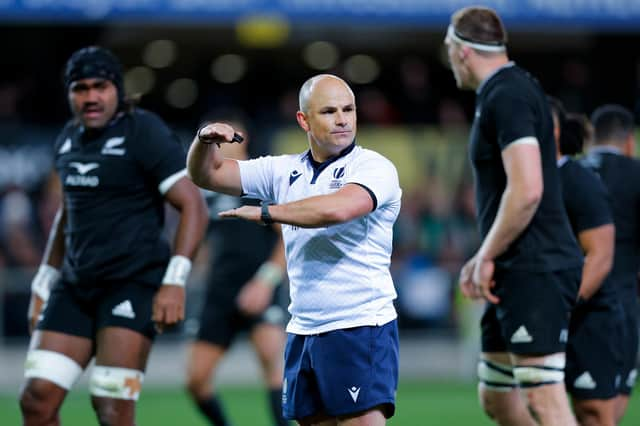Rugby referees need to be bolder and national coaches entitled to behave like they run a club


The host nations all have some reason to think that the gods had deserted them. Every match was close – in Scotland’s case closer than the score suggests. Against Ireland the All Blacks played more than half the match with only 14 men, and were indeed reduced to 13, even only 12, for short periods. Australia scored two tries to England’s one but under pressure conceded too many penalties which Owen Farrell kicked. Wales only nudged ahead in the last minute and even then it required a touchline conversion from Gareth Anscombe to secure victory. For Wales John Taylor’s famous 1971 kick at Murrayfield can no longer surely be regarded as the greatest conversion since St Paul.
Finally, if Scotland scored four tries to Argentina’s one, their opponents were as near as dammit to scoring three others themselves. Twice they were thwarted by marvellous last-second defence, and once they were denied a score when the TMO spotted a forward pass at an early phase of the attack. Any Argentinian fan was entitled to feel aggrieved, that forward pass being almost irrelevant. On the other hand TV coverage suggested it was so obvious that it was astonishing the referee didn’t spot it, blow his whistle and give Scotland a scrum. Perhaps referees now opt out of such snap decisions, knowing that TV replays will be available. There would be little cause for complaint if they were bolder.
Advertisement
Hide AdAdvertisement
Hide AdI don’t often find myself agreeing with Eddie Jones, but he is surely right to criticize excessive lengthy interruptions to play that result from appeals to the TMO and indeed from interruptions by that official. Referees are appointed to take charge of matches. They should trust their own judgement and make more decisions themselves. There are now often referrals to the TMO concerning a knock-on. If the man on the spot isn’t immediately sure that this was deliberate, he should call a scrum and get on with the game. As it is, too many players are harshly treated for what looks like a genuine attempt to intercept a pass.
It’s not often that a coach will make eight changes after a win like last Saturday’s, only two of them on account of an injury, which is what Gregor Townsend has done for Scotland. Of course, tours are always different from the Six Nations; one certainly wouldn’t expect so many changes after a convincing victory like last Saturday’s, and in any case one tends to think that winning the next match is more important than finding out more about other players. Nevertheless, given that we now play a dozen international matches in a calendar year, it’s understandable if the national coach more and more behaves like a club one. Few are surprised if Edinburgh or Glasgow coaches change half their starting XV the week after a good win.
Still, one is pleased to see Scott Cummings, injured throughout the Six Nations, back at lock, because he had seemed to be on the way to being the powerful hard-driving lock we need. The back row, excellent last week, has been retained. An interesting question will be asked when Jamie Ritchie is fit again. No doubt all four players will be accommodated, for even crotchety conservatives like me have accepted that professional rugby is now a 23 man game and that players waiting on the bench are part of that day’s team.
Injuries give Glasgow’s full-back Ollie Smith a first cap. Not 22 till next month, he came up through his home town club, Ayr, and is therefore a genuine product of domestic rugby. He scored his first two tries for Glasgow in January against La Rochelle, who went on to win the Heineken Cup. That, one is happy to observe, was a try more than star-studded Leinster managed in the final. The first time I saw him play he was so impressive that I stupidly forgot his Ayrshire roots and thought he was one of our imports from New Zealand. Good luck to the boy. He’s unlikely to be challenging Stuart Hogg for a while yet, but it’s nice to think there may now be an heir-in-waiting.